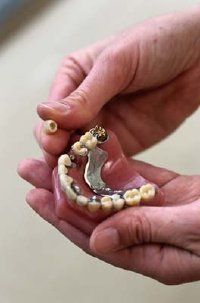Having dentures needn't be a painful, and these home remedies can ensure that it isn't.
From the Home Remedies Refrigerator
Figs. Mexicans, Hispanics from the American Southwest, and Arabs think figs are fabulous for fighting mouth sores. The fig remedy, however, requires some time, coordination, and of course, a fresh fig. Once you locate the prized fruit, cut it in half and set one half between your cheek and the sore spot on your gum. The open side of the fig should touch the gum. This is a bit tricky to keep in place, so plan on watching TV or keeping still while you fig out.
Soft foods. Eat like a baby during the adjustment period. You don't have to mash peas in a blender, but you should stick to soft, easy-to-chew foods such as soups, stews, and pastas (macaroni and cheese). If you chew on hard foods, such as carrots and pretzels, you'll risk damaging tender gum tissues that are still reeling from the shock of losing their natural teeth. For dessert, enjoy puddings, gelatin, and applesauce.
From the Home Remedies Sink
Soap. After teeth are extracted and new dentures fit, it's of prime importance to keep your new choppers sparkling clean. Excess bacteria buildup on dentures can retard the gum's healing process. Plain old soap, warm water, and a hand brush do a grand job at cleaning. Scrub at least twice a day and rinse well.
From the Home Remedies Spice Rack
Aniseed. This gentle herbal mouth rinse is perfect for sensitive mouths. Combine 2 teaspoons crushed aniseed, 1 tablespoon peppermint leaves, and 2 cups boiling water. Cover and steep for eight hours. Strain and add 1 teaspoon myrrh tincture, which acts as an antiseptic and preservative. Use 2 tablespoons twice a day for rinsing. The remainder of the rinse can be stored in a glass bottle. Shake before using.
Clove. The clove has been used as a remedy for aching mouths since antiquity. The clove remedy started in Asian folk medicine, and the concept traveled along trade routes to Europe and the Mediterranean along with the spice itself. By the third century b.c., the clove was the universal folk remedy for mouth and dental pain in the Mediterranean. Clove's medicinal use continued into the nineteenth century, when dentists used clove oil to relieve dental pain. Even today dentists use eugenol, a major ingredient in clove oil, as a pain reliever and to disinfect dental abscesses. Perhaps cloves' timeless popularity stems from the fact that they not only eliminate pain but also smell terrific. There's nothing like having a fresh and pain-free mouth all in one. To tap into these healing properties, blend 1 teaspoon cloves into a powder using a coffee grinder or use 1/2 teaspoon prepackaged ground cloves. Moisten with olive oil and dab around a mouth or gum sore.
Salt. Gargling with warm salt water may help denture-wearers breeze through the adjustment phase sans mouth sores. Prevent sore spots from becoming infected or inflamed by rinsing every three to four hours. The salt water cleans out bacteria, shrinks swollen tissue, and helps toughen the tender tissue. Make a saltwater rinse by adding 1/2 teaspoon salt to 4 ounces warm water. Gargle and spit. Do this twice daily.
Do Remember
- Give your mouth a rest. Always remove your false teeth at night. You may also want to remove dentures for 24 hours, should you develop a red spot on the gums.
- Have your dentures checked yearly.
- Have your dentures relined every two to three years.
- Replace dentures every five to six years, depending on the amount of wear and tear and the shrinkage of the gums.
For more information about denture pain and other bone health, try the following links:
David J. Hufford, Ph.D., is university professor and chair of the Medical Humanities Department at Pennsylvania State University's College of Medicine. He also is a professor in the departments of Neural and Behavioral Sciences and Family and Community Medicine. Dr. Hufford serves on the editorial boards of several journals, including Alternative Therapies in Health & Medicine and Explore.
This information is solely for informational purposes. IT IS NOT INTENDED TO PROVIDE MEDICAL ADVICE. Neither the Editors of Consumer Guide (R), Publications International, Ltd., the author nor publisher take responsibility for any possible consequences from any treatment, procedure, exercise, dietary modification, action or application of medication which results from reading or following the information contained in this information. The publication of this information does not constitute the practice of medicine, and this information does not replace the advice of your physician or other health care provider. Before undertaking any course of treatment, the reader must seek the advice of their physician or other health care provider.
